The world needs urgent climate action
On August 8th the United Nations Intergovernmental Panel on Climate Change, IPCC, released its special report on climate change and land.
To keep global warming below of 1.5 degrees Celsius we need to drastically reduce carbon fuel dependence and land degradation. And we have to hurry.
“Scientists say that we must immediately change the way we manage land, produce food and eat less meat in order to halt the climate crisis.” writes CNN.

Unsustainable land use increases climate change leading into a vicious cycle of desertification, soil erosion and unproductive land driving conversion of carbon sinks such as forests and wetlands into farmland. A plant based diet, less food waste, sustainable farming methods, better soil management and restoring natural carbon sinks are some solutions brought up in the report.
To come to terms with this pressing global challenge the is a need to take rapid action, in our households and communities, companies and organisations, institutions and governments. The urgency and severity of climate change urges us to make brave decisions, and find for new solutions where there are none.
The most severe effects of the changing climate will not be seen here in the nordic countries. However, as climate change does not consider political borders, we should see our actions as pieces in the larger global puzzle. In order to change how we produce, consume and waste food and other products, how we plan and exploit areas and how we manage resources we need to look beyond borders, sectors and disciplines to form collaborations and take action.

Openlab leads and supports processes for a sustainable future among public, private and academic actors in the Stockholm region. Our processes are focused on design methodology with an understanding of local contexts and user needs, interdisciplinary collaboration and an experimental mindset.
Learn and join the discussion about food, society and science with Openlab’s podcast Matlaboratoriet or follow our projects Frontrunners for Sustainable Innovation, Mistra Urban Futures, Stockholm Node, the Stockholm city’s environmental programme challenge and more.